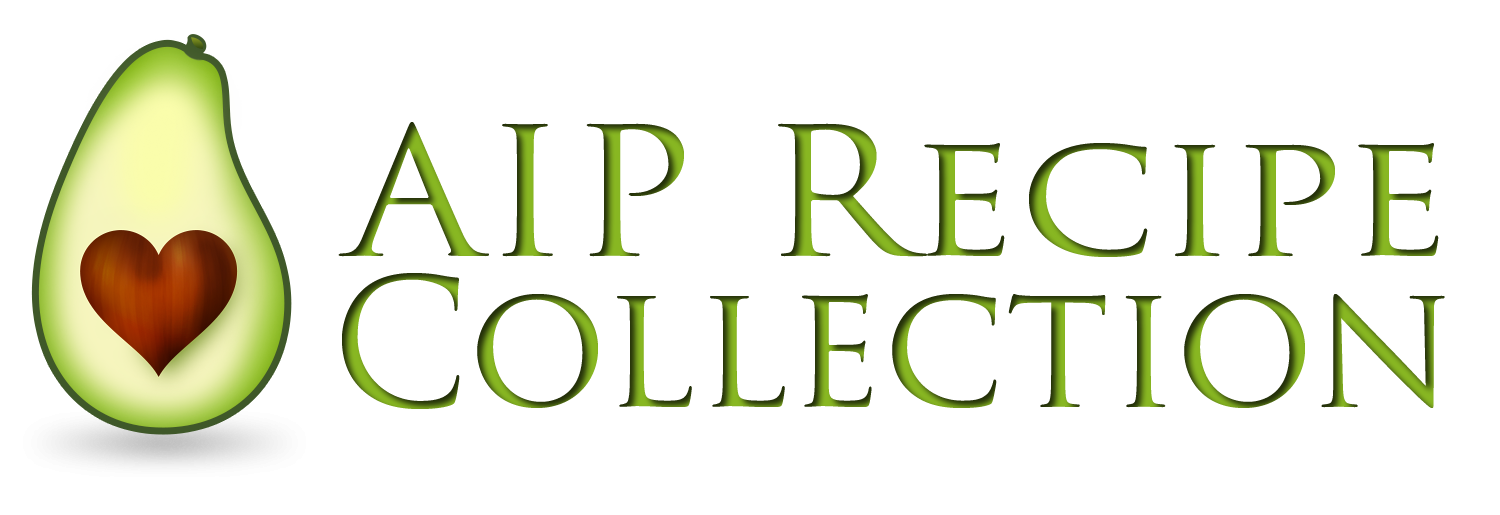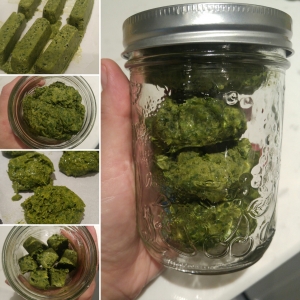This post contains affiliate links. Click here to see what that means.
AIP baking is a tricky thing, and even more of an exact science than regular baking, so you’ll have heard me say many times in the the AIP Recipe Collection Facebook Group that I do NOT recommend substitutions in AIP baking! You can read more on the topic in my article Substitutions in AIP Cooking & Baking so you understand why this is so important.
That said, many AIP recipes call for gelatin or agar agar powder or gelatin eggs, or if you’ve found a paleo recipe it may call for a flax or chia egg! All of this can be quite confusing, especially since some of them require that you make a gelatin egg separately and others just have you adding gelatin to the mix.
So, what’s the breaking news on AIP egg replacements (see what I did there)? And, can’t I just use the egg replacements available at the grocery store? Here are the answers you’ve been looking for!
The Purpose of Eggs in Baking
Eggs are used for several reasons in baking; binding (holding things together like meatloaf and meatballs – this is the job of the whites), leavening (rising and creating a light fluffy texture – this is the job of the yolk), for moisture and also for flavor and appearance (often aids in browning).
Can we cook and bake with out them? Absolutely!
Will the replacements yield perfect results? No – unfortunately there is nothing that will ever perfectly replace an egg! BUT we can get pretty darn deliciously close!
Things to consider:
Binding – You’ll find that most meatloaf and meatball recipes work perfectly well without eggs, or maybe you just need to add a little mashed veg in as an alternate binder.
Leavening – You’ll find many AIP baking recipes call for cream of tartar – this is a leavening agent and should never be omitted from a recipe just because you don’t have it – the results will literally be a flop.
Moisture & Appearance – Most AIP recipes make up for eggs in other ways, and recipe creators go to great lengths to ensure the the dishes they’re presenting look and taste as close to traditional recipes as possible – so don’t mess with a good thing – follow the AIP recipes folks! If you haven’t checked out the post I suggested, here it is again – Substitutions in AIP Cooking & Baking.
In general, it’s not a good idea to try to recreate a traditional recipe into an AIP compliant version if you’re replacing more than 1 or 2 eggs. Why? Because more than this and you’re at risk of your recipe caving in, coming out too dry, too wet, crumbly, too dense, or just not what you expected.
Commercial Egg Replacements
Let’s start here since this would be considered the path of least resistance and most enticing for some.
The reason why we don’t use these is the ingredients -most contain grain potato starch, corn starch, guar gum and the like. So, sorry folks, this option just doesn’t work.
Apple Sauce, Mashed Bananas, Pumpkin & Avocado
Next we’ll move on to old, traditional favorite substitutions that our mothers and grandmothers would have used. In general I don’t see a lot of AIP baked opting for these substitutes now-a-days – most AIP recipe creators have moved on to something a little more shall we say, egg-like! However, before we go there …
Mashed fruits like bananas and avocado, apple sauce and pumpkin/squash puree can often be a good substitute for an egg in recipe. It’s really very subjective though and you must decide on a recipe by recipe basis what is most suitable. Overall however, these options work best in cakes, muffins and brownies.
Whichever of these options you choose to use, you can replace each egg with 1/4 cup (65 grams) of purée.
Baked goods made with puréed fruits may not brown as deeply, but they will be very dense and moist.
Be aware that banana will obviously give you more of a banana flavor, so if you want something neutral – try some of the others instead
Agar-Agar & Gelatin
Before we dive in, I will tell you that while neither of these replacements should affect the flavor of your finished product, they may create a slightly stiffer texture. Unfortunately, nothing can replicate the egg exactly.
Gelatin
Gelatin eggs are probably the most commonly suggested egg substitute that you’ll see in recipes. If you’ve made one before, you’ll know why – it’s very close to the texture and viscosity of egg whites. Neither of these replacements should affect the flavor of your finished product, but they may create a slightly stiffer texture.
When it comes to gelatin, quality matters (sorry guys – Knox Gelatine is out as it’s highly processed and not from well cared for animals) – be sure to use gelatin made from grass-fed / pasture-raised animals (pigs – called porcine gelatin and/or cows – called beef gelatin – you can find quality gelatin brands here, from our partners at Perfect Supplements (See coupons page for current offers) or in our Amazon storefronts – go here and follow the link for either USA, Canada or the UK).
METHOD #1:
While there are several ways to make a gelatin egg, this is my favorite and it’s never failed me yet!
1 Tbsp Gelatin (Save upto 35% with Code: AIP10)
1/4 Cup Water
Add water to a small pot and sprinkle the gelatin over top.
Allow to sit for 2-3 minutes until the mixture hardens somewhat.
Place the post on a burner set to low heat for 1-2 minutes until the gelatin starts to melt. Be careful not to burn it! I usually stand by and start immediately whisking it.
Remove the pot from the heat and vigorously whisk until the mixture becomes frothy.
METHOD #2:
To replace one egg, dissolve 1 tablespoon (about 9 grams) of unflavored gelatin in 1 tablespoon (15 grams) of cold water. Then, mix in 2 tablespoons (30 grams) of boiling water until frothy.
AN IMPORTANT NOTE on gelatin: Just because you see a recipe calls for gelatin, it does not mean you will necessarily mean that you will go through the process of making a gelatin egg separately before adding it to the recipe. Follow the instructions as set out in the recipe you’re using for best results. IF the recipe indicates you are using gelatin and water to make a gelatin egg, follow those directions carefully as there are different ways to make a gelatin egg and the specific method recommended may yield better results in that particular recipe.
Agar Agar
If you’re avoiding animal products (though on the AIP you really shouldn’t be – read my article about that – Can the AIP Be Done As a Vegetarian?), you can opt for agar-agar powder or flakes. Agar agar is a vegan alternative to gelatin and is made from a type of seaweed or algae – you can find it here.
I’ve seen different suggestions for how to make an agar agar egg, so you’re going to be best to follow the instructions carefully in any recipe that you find if it calls for agar agar. Again, similar to gelatin, each recipe creator may have very specific reasons for using more or less water in the mix.
That said, here is the information I’ve found for you about making an agar agar egg!
METHOD #1:
Dissolve 1 teaspoon (approximately 4 grams) of agar-agar powder in 1 tablespoon of water to replace one egg.
To dissolve, first sprinkle the powder over the liquid, allow to rest for 5 minutes and then warm to 90 C over medium heat on the stove top.
Using a whisk, whip the agar mixture well to help dissolve, then refrigerate for 15 minutes and whip again. Add the agar to the baking mixture as the last ingredient and mix to just combine, do not overwork the mixture.
METHOD #2:
Use 1 tablespoon (9 grams) of agar-agar powder mixed with 1 tablespoon (15 grams) of water to replace one egg.
NOTE: If you have agar-agar flakes, be sure to grind them into a fine powder first as this will make a difference.
Vinegar & Baking Soda
I haven’t seen this one used all that much in AIP baking, but have heard of some using it successfully.
When mixed together, vinegar and baking soda start a chemical reaction that produces carbon dioxide and water, which makes baked goods light and airy, making this an especially good option for cakes and cupcakes.
Mixing 1 teaspoon (7 grams) of baking soda with 1 tablespoon (15 grams) of apple cider vinegar can replace one egg in most recipes.
Arrowroot Powder
I’ll admit to never having heard of this used as a specific egg replacement, but it very likely is that our AIP recipes employ these ingredients without us even realizing it! I can’t say this would be my go-to of choices by any means if I were simply trying to substitute an egg in any recipe.
A mixture of 2 tablespoons (about 18 grams) of arrowroot powder and 3 tablespoons (45 grams) of water can be used to replace one egg.
Carbonated Water
Carbonated water will obviously add moisture to a recipe, but it also acts as a leavening agent since the carbonation traps air bubbles, which help make the finished product light and fluffy.
You can replace each egg with one-fourth cup (60 grams) of carbonated water and the substitution is said to works well for cakes, cupcakes and quick breads. Again – I suggest sticking to AIP expert tested/created recipes rather than trying to reinvent the wheel.
Flax & Chia Eggs
While these are a wonderful Paleo option in baking going forward, if you’re on the AIP and still in the elimination stage, this option simply isn’t suitable for you.
BUT, if you’ve reintroduced these, here’s how to make them:
To replace one egg, whisk together 1 tablespoon (7 grams) of ground chia or flaxseeds with 3 tablespoons (45 grams) of water until fully absorbed and thickened.
Doing so may cause baked goods to become heavy and dense. Also, it may result in a nuttier flavor, so it works best in products like pancakes, waffles, muffins, breads and cookies.

Resource: Healthline – Effective Substitutes for Eggs




